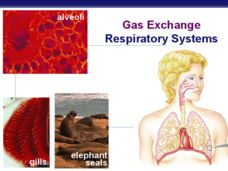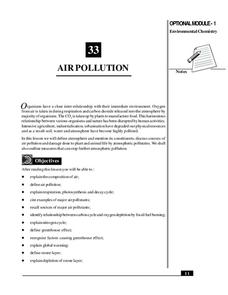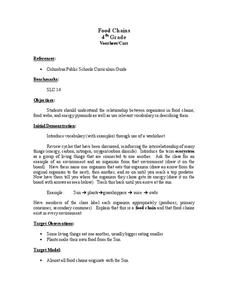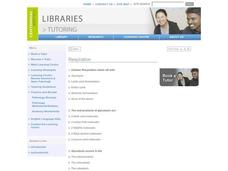University City High School
Metabolism Lesson Plan
Not a lesson in the traditional sense, this is a collection of resources with which you can craft a lesson on metabolic processes. It includes an outline of topics, some brief discussion, and a large array of animations, images, and...
Curated OER
Gas exchange: Respiratory Systems
The need for a respiratory system in humans versus being reliant on gas exchange structures is demonstrated. There are many details about the advantages and disadvantages of each mechanism. Students are able to learn about the...
Curated OER
The Krebs Cycle and Electron Transport
A three-page, mostly multiple choice quiz that would work great as a pretest/post-test for the topic of cellular respiration. It also includes diagram interpretation and a couple of short-answer written response questions. Depending on...
Curated OER
Circulatory Systems
Excellent diagrams, labels and summaries make this resource be valuable to your students throughout the topic of circulation. All types of circulation vessels are explained, their structure and function is detailed, and the overall...
Texas State Energy Conservation Office
Global Climate Change
Here is an extensive reading resource that addresses our climate change crisis. It thoroughly explains the greenhouse effect, related Earth cycles, and the history of climate change. Use it as part of the intended unit, published by the...
Columbus City Schools
Photosynthesis and Respiration
Thirty percent of the world's oxygen is produced by rainforests found throughout the world. Seventh grade learners explore the processes of photosynthesis and respiration through 10 days of labs, manipulatives, and discussions. They...
Curated OER
How do plant & animal cells make and use energy?
Students show the relationship between the need for plants to undergo photosynthesis in order to generate oxygen. They see the flaws associated with this thinking because of the lack of CO2 and H2O and lack of sufficient gravity in order...
Curated OER
Dissolved Oxygen Lesson
Students investigate what dissolved oxygen is and why it is important to aquatic life and what factors influence levels of dissolved oxygen in a lake. They study how to use MS Excel to make charts to show trends and correlations.
National Institute of Open Schooling
Air Pollution
Seventy percent of the air pollution in China is due to car exhaust. Under the umbrella of environmental chemistry, learners extensively explore air pollution. From the makeup of our atmosphere to sources of major air pollutants, classes...
Serendip
Using Models to Understand Cellular Respiration
Energize biologists with colorful images in an activity that captivates the imagination while demystifying the subject of cellular respiration. Participants build comprehension skills and access core content knowledge by analyzing text...
Curated OER
What Do Plants Need?
Students experiment with plants. In this plant lesson, students research the needs of plants. Students determine if all plants have the same requirements for growth. In small groups, students experiment with different plants.
Curated OER
Food Chains
Fourth graders investigate food chains. They review cycles and discuss ecosystems. They select an environment and create a food chain in small groups. They write their food chain and label it for the class to evaluate. They create...
Curated OER
Plants and Animals Depend Upon One Another
First graders study plants and animals and how they depend on one another. They also study that plants give energy to animals and provide oxygen needed for life. Finally, 1st graders give examples of the roles plants and animals play...
Curated OER
Respiration
In this cellular respiration worksheet, learners answer 14 multiple choice questions related to aerobic and anaerobic respiration.
Curated OER
Getting Energy to Make ATP
In this cellular energy worksheet, students review the stages of cellular respiration and contrast fermentation with cellular respiration. This worksheet has 6 fill in the blank and 6 short answer questions.
Teach Engineering
Photosynthesis—Life's Primary Energy Source
Wouldn't it be great if you could produce your own food? Scholars learn about the processes of photosynthesis and cellular respiration in plants. They consider how to use photosynthesis as a model of an efficient system and how to apply...
Curated OER
Marine & Aquatic Habitats -- Journey of a Drop of Water Through a Watershed
Learners discuss pollution and the steps in the hydrologic cycle. They follow a drop of water through a watershed simulation. They discover the components of a water cleaning system as well.
Curated OER
Physical and Chemical Changes
Sixth graders complete several experiments about chemical and physical changes. In this physical and chemical science lesson, 6th graders complete 6 experiments about chemical and physical changes. Students examine the processes of...
Curated OER
Food Chains
Learners take a look at the relationship between organisms in food chains, food webs, and energy pyramids. After an opening demonstration by the teacher, pupils are split up into groups. Each one is assigned an environment such as:...
Curated OER
Solid Waste Recycling
Students seek scientific and technological solutions to envrionmental problems. They record class activities in a journal. They identify relationships among living things and their environments.
Serendip
Where Does a Plant's Mass Come From?
Where does the mass for a growing tree come from? Scholars consider a few different hypotheses and guess which is correct. They then analyze data from different experiments to understand which concepts science supports.
Curated OER
Photosynthesis
If you need summary notes for independent study, or a Powerpoint to review as a class, then these slides will fit your need. There are really great, quite detailed, diagrams and some slides to summarize the 2 stages of reactions in...
Curated OER
Cellular Respiration: Harvesting Chemical Energy
A complete overview of oxidation, reduction, and how electrons are moved in respiration. You could use this slide show to elaborate on the concept of harvesting stored energy, and to summarize the stages of aerobic and anaerobic metabolism.
Serendip
Food, Energy and Body Weight
High schoolers learn why humans need calories, how they control weight with food choices, and the impact of exercise on energy. Scholars then apply their understanding to a case study of lunch choices and exercise.

























